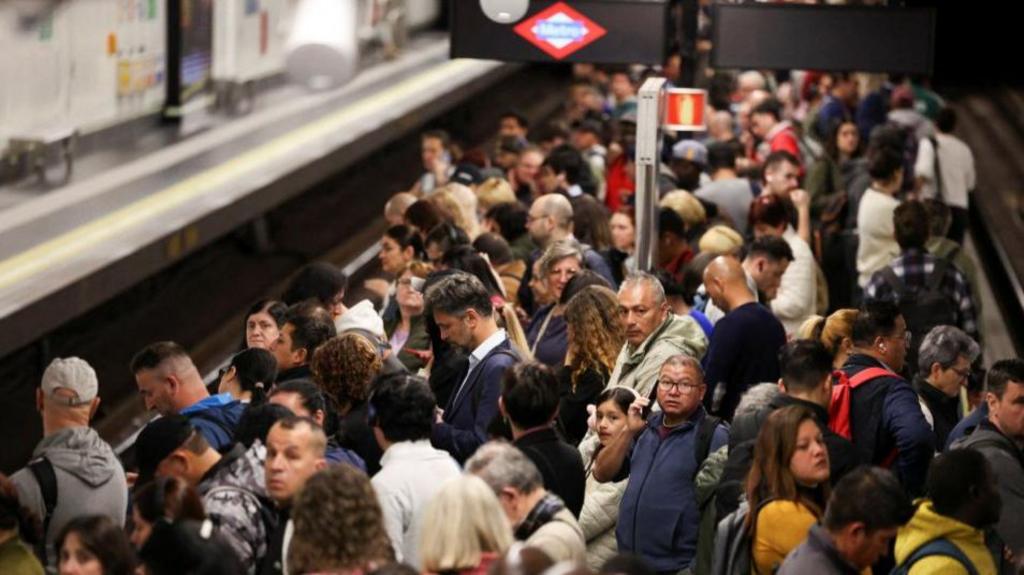As daily life resumes in Spain and Portugal, the focus is shifting from the immediate causes of last week’s massive power outage to the strategies required to prevent a recurrence of such a widespread failure.
Normal service on Spain’s national grid was only declared at 11:15 (09:15 GMT) on Tuesday, nearly 23 hours after the blackout began, marking the end of an unprecedented interruption.
Train services are returning, though some routes remain suspended, and electricity has been restored to most households across the country.
Questions remain over the technical process behind the restoration and the causes of such an extended disruption.
Monday, for much of Spain, was characterised by profound disorder and disruption.
Evidence indicates that two separate failures occurred within seconds in the southwest, followed by almost an hour-long loss of connection to the French grid.
Prime Minister Pedro Sánchez emphasised the abrupt disappearance of 15 gigawatts from the grid at 12:33 on Monday, wiping out approximately 60% of Spain’s electricity supply instantaneously.
Red Eléctrica operations director Eduardo Prieto confirmed the system had been stable until the loss of generation in the southwest triggered the cascade.
Notably, the Canary Islands, Balearics, and Spanish territories in North Africa remained unaffected throughout the crisis.
Scrutiny is increasing over whether an intensifying reliance on solar generation and renewables contributed to grid instability.
Just before the outage, Spain was sourcing over 60% of its power from solar photovoltaics, with wind and nuclear accounting for most of the remainder.
Despite Spain’s sophisticated and diversified energy mix, the failure demanded a vast, coordinated effort to resume supply nationwide.
The initial priority, according to Red Eléctrica, was reactivating key generating regions to “gradually re-energise the transmission grid as units returned to operation.”
Experts noted that reconnecting all assets simultaneously risked another blackout, so authorities staggered the restart, adopting what is known as a “black start.”
Hydroelectric plants—specifically pumped-storage facilities, which were at peak capacity for the season—played a foundational role in the recovery because of their rapid response capabilities.
Combined-cycle gas stations were also crucial, though the incident forced an automatic shutdown of four nuclear reactors at Almaraz, Ascó, and Vandellós, with three others offline.
Support arrived from Spain’s neighbours as well: France and Morocco contributed to the restoration effort.
Morocco announced it had supplied 900MW of electricity via two high-voltage connections from Fardioua to Tarifa.
Meanwhile, French operator RTE progressively channelled more power through connections to Catalonia and the Basque region to stabilise supplies.
RTE stated the Iberian grid was detached between 12:38 and 13:30 on Monday; after reconnection, France quickly provided 700 MW, which was later increased to as much as 2,000 MW.
These efforts enabled power to return to substations across northern, southern, and western Spain.
By 19:20 on Monday, more than one-fifth of the country’s electricity demand had been met through a combination of domestic and French imports.
Energy supplier Endesa reported that by 19:15, it had restored power to nearly 3.5 million customers, giving first priority to hospitals and essential infrastructure.
Shortly after, Red Eléctrica chief Eduardo Prieto announced around 9,200 MW—approximately 35% of expected demand—had resumed.
Restoration progressed steadily—reaching 61% by midnight Monday and exceeding 99% by 7am on Tuesday.
Attention is now turning to the substantial economic aftermath. Spanish employers association CEOE estimates losses of €1.6 billion.
Political blame has flared, with recriminations from multiple parties over the crisis response.
Madrid regional president Isabel Díaz Ayuso criticised the state for a slow and inadequate response, while opposition leader Alberto Núñez Feijóo called the scenes “lamentable” for Spain’s global image.
Yet, government officials have commended the resilience and solidarity of the Spanish public.
Hospitals were able to maintain critical services through backup diesel generators.
Spain’s Guardia Civil reported the rescue of 13,000 rail passengers stranded by the outage.
In Villanueva de Córdoba, locals offered support to those caught aboard a halted Ouigo train.
Barcelona’s traffic police reverted to manual regulation at Plaça Espanya amid the blackout-induced traffic signal failure.
Subway passengers in Barcelona were forced to walk through tunnels guided by mobile phone flashlights after becoming trapped underground.
Girona’s conference centre was rapidly repurposed into a 180-bed shelter for those stranded by rail shutdowns.
Airport operator Aena managed to keep flights operational nationwide, thanks to emergency generators, though delays were widespread.
As communications faltered, many families relied on car or battery-powered radios for updates as broadcasters persevered through the night.
Authorities in Madrid urgently appealed for blood donations ahead of a major holiday weekend.
Prime Minister Sánchez has committed to a comprehensive review to safeguard against a repeat of the crisis.
Nevertheless, energy analyst Carlos Cagigal warned on Spanish television that current infrastructure may still be inadequate to handle surging levels of renewable generation.
Red Eléctrica had previously cautioned about the challenges of integrating excessive renewables while phasing out nuclear resources.
However, a resurfaced clip of grid president Beatriz Corredor from 2021 shows her declaring Spain’s electrical system among the safest and most advanced worldwide, stating there was “no cause for concern.”
According to initial findings from the Spanish grid operator, there is no evidence of a cyber attack behind the incident.
While power has now returned to the majority of Spain and Portugal, the repercussions of the blackout are ongoing.
Recent data illustrate a 47% year-on-year increase in visitor numbers for April.
Spain has declared a national state of emergency as millions experienced blackouts amidst scenes of disruption.
So far, 96 outbound flights have been cancelled at Portuguese airports, while 45 departures were axed in Spain.

